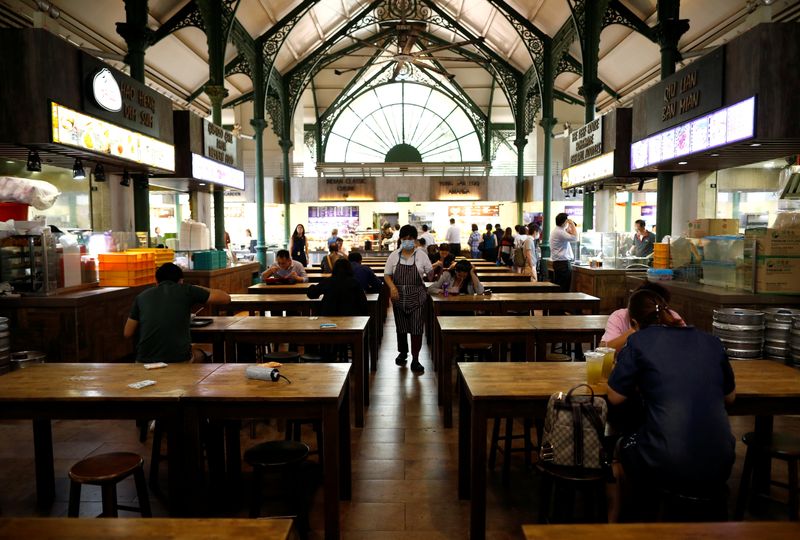By Xinghui Kok and Chen Lin
SINGAPORE (Reuters) - Singapore announced on Tuesday narrower fiscal deficits in a budget aimed at helping households manage the rising cost of living while replenishing its pandemic-depleted coffers.
The fiscal position is "appropriate for the projected economic conditions this year", finance minister Lawrence Wong told parliament as he presented details of the 2023 budget.
Wong, also deputy prime minister, said the government collected higher-than-expected revenue last year, resulting in a smaller deficit of S$2 billion ($1.51 billion) for the 2022 fiscal year instead of the initially estimated deficit of S$3 billion, or 0.5% of GDP.
For 2023, the expected shortfall would be S$0.4 billion, or 0.1% of GDP.
Wong announced tax changes that would affect higher-income Singaporeans and large companies but also more support for low-income families, top-ups for a medical assistance fund and a support package to offset a hike in sales tax.
"With a stronger fiscal position than last year, deputy prime minister Lawrence Wong's Valentine Budget 2023 has rightfully provided a slew of goodies for lower-income earners, working mothers, and retirees through various enhancements," Ajay Kumar Sanganeria, a partner at KPMG Singapore, said.
Singapore's trade-reliant economy faces headwinds this year from slowing global growth, inflation and rising interest rates. Meanwhile, its expenditures are increasing due to the climbing cost of healthcare, driven by an ageing population.
From Wednesday, buyers of residential properties valued between S$1.5 million and S$3 million would be taxed at 5%, while those buying properties above S$3 million would be taxed at 6%. The current rate for buyers' stamp duty is 4%.
Wong also unveiled "more progressive" vehicle taxes affecting the top one-third of car buyers that would generate S$200 million in additional revenue per year.
"Our system is based on collective responsibility," he said. "Everyone contributes something, but those who are better off contribute more."
This comes on top of changes in last year's fiscal policy that already increased taxes for wealthier Singaporeans in their income and property and luxury car purchases.
The city-state also intends to implement a domestic top-up tax to bring taxes for large corporations to 15% by 2025. This is to meet pillar 2 of the Organisation for Economic Co-operation and Development's base erosion and profit shifting (BEPS) 2.0 framework.
Wong said global developments on BEPS 2.0 are fluid and Singapore would monitor it. "If there are additional delays, we will adjust our implementation timeline," said Wong.
SUPPORT PACKAGE
Wong said Singapore must brace for higher inflation but added that the government would help citizens and businesses weather cost pressures.
The government will enhance a support package to help Singaporeans offset a recent sales tax hike from S$6.6 billion ($4.97 billion) to S$9.6 billion.
The second step of a scheduled sales tax hike would go ahead as planned in 2024. The sales tax will increase to 9% next January, after increasing from 7% to the current 8% on Jan. 1 this year.
Wong said this would offset all the spending increases lower-income households face due to inflation and the sales tax hike, while "substantially covering" spending increases for middle-income households.
"Budget FY2023 is planned around a balanced budget, said Maybank analyst Chua Hak Bin.
"There is greater fiscal space in budget FY2023 to allow for more top-ups to endowment and trust funds for medium-term objectives compared to last year's budget, which was more constrained because of the COVID relief measures."
Singapore's 2023 core inflation is forecast at 3.5%-4.5% and headline inflation at 5.5%–6.5%.

For 2022 as a whole, core inflation averaged 4.1%, higher than the 0.9% recorded in 2021. Meanwhile, headline inflation came in at 6.1% last year, up from 2.3% in 2021.
($1 = 1.3271 Singapore dollars)